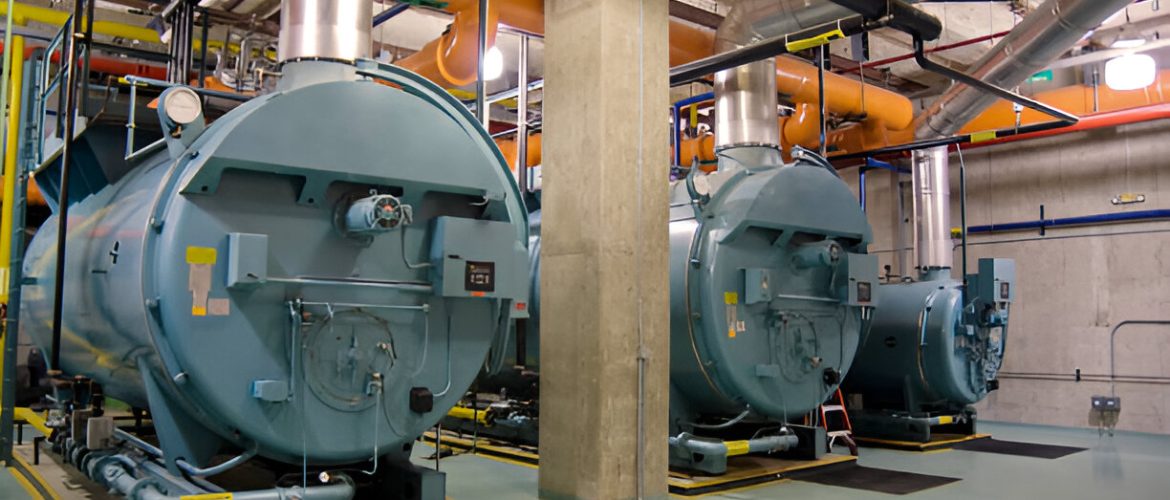Industrial boilers are critical to various industries in Dubai, including manufacturing, food processing, healthcare, and hospitality. They provide the necessary heat or steam for essential processes such as sterilization, heating, and energy generation. However, not all boilers are the same, and choosing the right type can significantly affect your operational efficiency, energy consumption, and cost-effectiveness.
This article provides an overview of the different types of industrial boilers available in Dubai, helping businesses understand their options and make informed decisions.
1. Fire-Tube Boilers
Fire-tube boilers are among the most common types of boilers used in smaller industrial facilities. They consist of a shell filled with water, through which hot gases pass. The heat from these gases is transferred to the water, generating steam or hot water.
Key Features:
- Best for low to medium pressure applications
- Relatively compact and easy to install
- Require less maintenance than other types
Ideal For:
Fire-tube boilers are suitable for small- to medium-scale industries, such as hotels, food processing units, and laundries, where moderate pressure and steam volumes are required.
2. Water-Tube Boilers
Unlike fire-tube boilers, water-tube boilers circulate water through tubes heated by external combustion gases. These boilers are designed to handle higher pressure and steam generation requirements, making them ideal for large-scale industrial operations.
Key Features:
- Suitable for high-pressure applications
- Higher efficiency compared to fire-tube boilers
- Capable of producing large volumes of steam
Ideal For:
Industries with high-pressure requirements, such as chemical plants, power generation facilities, and refineries, benefit from water-tube boilers.
3. Electric Boilers
Electric boilers are becoming increasingly popular in industries aiming to reduce their carbon footprint. Instead of burning fuel, they use electricity to heat water, producing steam or hot water.
Key Features:
- Zero emissions and environmentally friendly
- Highly efficient with minimal energy loss
- Compact design with easy installation
Ideal For:
Industries with access to renewable energy sources or those needing low-pressure steam for sterilization or heating in hospitals, laboratories, and cleanrooms.
4. Oil- and Gas-Fired Boilers
These boilers use oil or natural gas as fuel to produce heat. They are among the most widely used industrial boilers in Dubai due to the availability of fuel and high energy efficiency.
Key Features:
- High thermal efficiency
- Rapid startup and shutdown
- Suitable for both steam and hot water applications
Ideal For:
Industries such as textile manufacturing, food processing, and large-scale residential heating systems can benefit from oil- and gas-fired boilers due to their reliability and fuel availability.
5. Biomass Boilers
Biomass boilers use organic materials such as wood chips, agricultural waste, or pellets as fuel. They are an eco-friendly alternative to fossil fuel boilers, especially for industries aiming to lower their carbon emissions.
Key Features:
- Sustainable and renewable fuel source
- Lower emissions compared to conventional fuel boilers
- Can use various types of biomass as fuel
Ideal For:
Agriculture-based industries, food processing plants, and facilities committed to green initiatives can benefit from biomass boilers.
6. Waste Heat Recovery Boilers
Waste heat recovery boilers (WHRBs) are designed to utilize the waste heat generated from industrial processes to produce steam. This type of boiler improves overall energy efficiency by converting otherwise wasted heat into useful energy.
Key Features:
- Significant energy savings by utilizing waste heat
- Reduces overall fuel consumption
- Suitable for integration with existing systems
Ideal For:
Industries with high-temperature processes, such as metal manufacturing, cement plants, and power plants, can greatly benefit from WHRBs.
How to Choose the Right Industrial Boiler
Selecting the right industrial boiler involves understanding your specific operational requirements. Here’s what to consider:
- Capacity Requirements
Determine the steam or hot water output you need to meet your production goals. - Operating Pressure
Different applications require different pressure levels. High-pressure boilers are needed for power generation and large-scale manufacturing, while low-pressure boilers suffice for heating and sterilization. - Fuel Type
Consider the availability and cost of fuel. In Dubai, natural gas and oil are commonly used, but if your business is focused on sustainability, electric or biomass boilers may be better options. - Efficiency
High-efficiency boilers reduce operational costs by minimizing fuel consumption and heat loss. - Maintenance and Support
Choose a boiler system that comes with reliable after-sales service, including regular maintenance and spare parts availability.
Why Work with a Reliable Boiler Provider in Dubai?
Collaborating with a trusted boiler provider ensures that you receive high-quality, energy-efficient boilers tailored to your industrial needs. Providers like Isaac Boilers Pvt. Ltd. in Dubai offer a range of industrial boiler solutions, including oil- and gas-fired boilers, waste heat recovery systems, and customized maintenance services.
Their expertise in various boiler types and extensive service offerings ensures smooth operations and optimal performance for businesses across multiple sectors.
FAQs
1. What is the difference between fire-tube and water-tube boilers?
Fire-tube boilers are best for low- to medium-pressure applications and are compact, whereas water-tube boilers are designed for high-pressure, high-capacity applications, making them ideal for large industries.
2. Are electric boilers suitable for industrial use?
Yes, electric boilers are highly efficient and suitable for industries that need low-pressure steam or want to reduce their carbon footprint by using renewable energy sources.
3. How can I improve the efficiency of my industrial boiler?
You can enhance boiler efficiency by performing regular maintenance, optimizing fuel combustion, insulating pipes, and ensuring proper water treatment to prevent scale buildup.
4. What industries benefit most from biomass boilers?
Agricultural, food processing, and any industries focused on sustainable energy solutions benefit significantly from biomass boilers.




No comments yet.